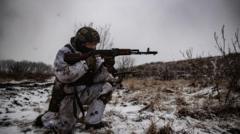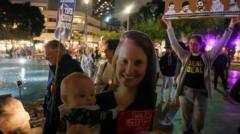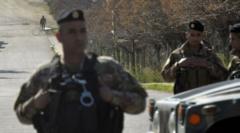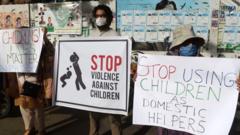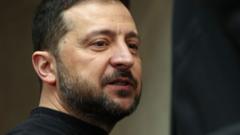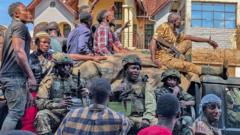The families of four young Israeli hostages who were released from Hamas captivity in Gaza have disclosed the profound physical and psychological abuse their daughters faced, including starvation and intimidation. The women, primarily held in underground facilities, were forced into labor and subjected to tragic psychological coercion, including participation in propaganda videos. As they strive to recover, both the hostages and their families grapple with the aftermath of their harrowing ordeal.
Harrowing Stories of Israeli Hostages Released from Hamas Captivity

Harrowing Stories of Israeli Hostages Released from Hamas Captivity
Parents of young Israeli women freed from Hamas recount the trauma experienced during captivity, shedding light on the abuse, starvation, and manipulation they endured.
The article text:
Parents of four young Israeli women freed from Hamas captivity have shared their harrowing accounts of the abuse and deprivation their daughters endured during fourteen months of detention. Orly Gilboa, the mother of Daniella Gilboa, revealed that her daughter only received proper nutrition prior to her release. Recurring themes among parents include starvation, intimidation, and exploitation for forced labor, such as cooking and cleaning under duress.
In their communications with media, the families recounted how the hostages were confined in various locations, including underground tunnels and improvised structures, often deprived of daylight. They spoke of the mental resilience their daughters formed by sharing stories, drawing, and maintaining diaries while living in constant fear of physical violence and coercion, including being coerced into creating Hamas propaganda videos.
Since their release, none of the four women have engaged with the media, as their families cite the need for caution due to ongoing risks to other hostages. Three of these young women were soldiers abducted during a Hamas attack on the Nahal Oz military base on October 7, 2023, which subsequently resulted in significant military and civilian casualties in Gaza and Israel.
The treatment and sustenance of the hostages fluctuated during their imprisonment. Shlomi Berger, father of soldier Agam Berger, recounted how some facilities offered adequate food, while others forced the hostages to subsist on meager rations. Danielle Gilboa, reflecting on the condition of fellow hostages during their release, remarked that her own frail appearance might have mirrored that of comrades rescued earlier.
Families shared the agony of witnessing distressing propaganda videos that falsely suggested the death of their daughters. Orly Gilboa described her emotional turmoil upon seeing her daughter portrayed as deceased. As more details about their families' experiences emerge, one common thread is the struggle for these young women to reconcile their captivity with their return to normal life.
The families stress the need for thorough investigations into the security lapses that facilitated the Hamas attack, hinting at warnings ignored prior to the event. The ongoing dangers perceived by the hostages of those still held in Gaza emphasize their calls for a sustained ceasefire to facilitate further releases.
Furthermore, the psychological scars from captivity bear heavily on their recovery. Parents described how their daughters coped with the trauma through creative expression and recounting the experiences they shared during confinement. These methods provided a sense of normalcy amid the chaos. As the process of rehabilitation begins, families focus on gradual adjustments back to life in Israel, nurturing bonds that had been strained to their limits during the traumatic ordeal.
Parents of four young Israeli women freed from Hamas captivity have shared their harrowing accounts of the abuse and deprivation their daughters endured during fourteen months of detention. Orly Gilboa, the mother of Daniella Gilboa, revealed that her daughter only received proper nutrition prior to her release. Recurring themes among parents include starvation, intimidation, and exploitation for forced labor, such as cooking and cleaning under duress.
In their communications with media, the families recounted how the hostages were confined in various locations, including underground tunnels and improvised structures, often deprived of daylight. They spoke of the mental resilience their daughters formed by sharing stories, drawing, and maintaining diaries while living in constant fear of physical violence and coercion, including being coerced into creating Hamas propaganda videos.
Since their release, none of the four women have engaged with the media, as their families cite the need for caution due to ongoing risks to other hostages. Three of these young women were soldiers abducted during a Hamas attack on the Nahal Oz military base on October 7, 2023, which subsequently resulted in significant military and civilian casualties in Gaza and Israel.
The treatment and sustenance of the hostages fluctuated during their imprisonment. Shlomi Berger, father of soldier Agam Berger, recounted how some facilities offered adequate food, while others forced the hostages to subsist on meager rations. Danielle Gilboa, reflecting on the condition of fellow hostages during their release, remarked that her own frail appearance might have mirrored that of comrades rescued earlier.
Families shared the agony of witnessing distressing propaganda videos that falsely suggested the death of their daughters. Orly Gilboa described her emotional turmoil upon seeing her daughter portrayed as deceased. As more details about their families' experiences emerge, one common thread is the struggle for these young women to reconcile their captivity with their return to normal life.
The families stress the need for thorough investigations into the security lapses that facilitated the Hamas attack, hinting at warnings ignored prior to the event. The ongoing dangers perceived by the hostages of those still held in Gaza emphasize their calls for a sustained ceasefire to facilitate further releases.
Furthermore, the psychological scars from captivity bear heavily on their recovery. Parents described how their daughters coped with the trauma through creative expression and recounting the experiences they shared during confinement. These methods provided a sense of normalcy amid the chaos. As the process of rehabilitation begins, families focus on gradual adjustments back to life in Israel, nurturing bonds that had been strained to their limits during the traumatic ordeal.


